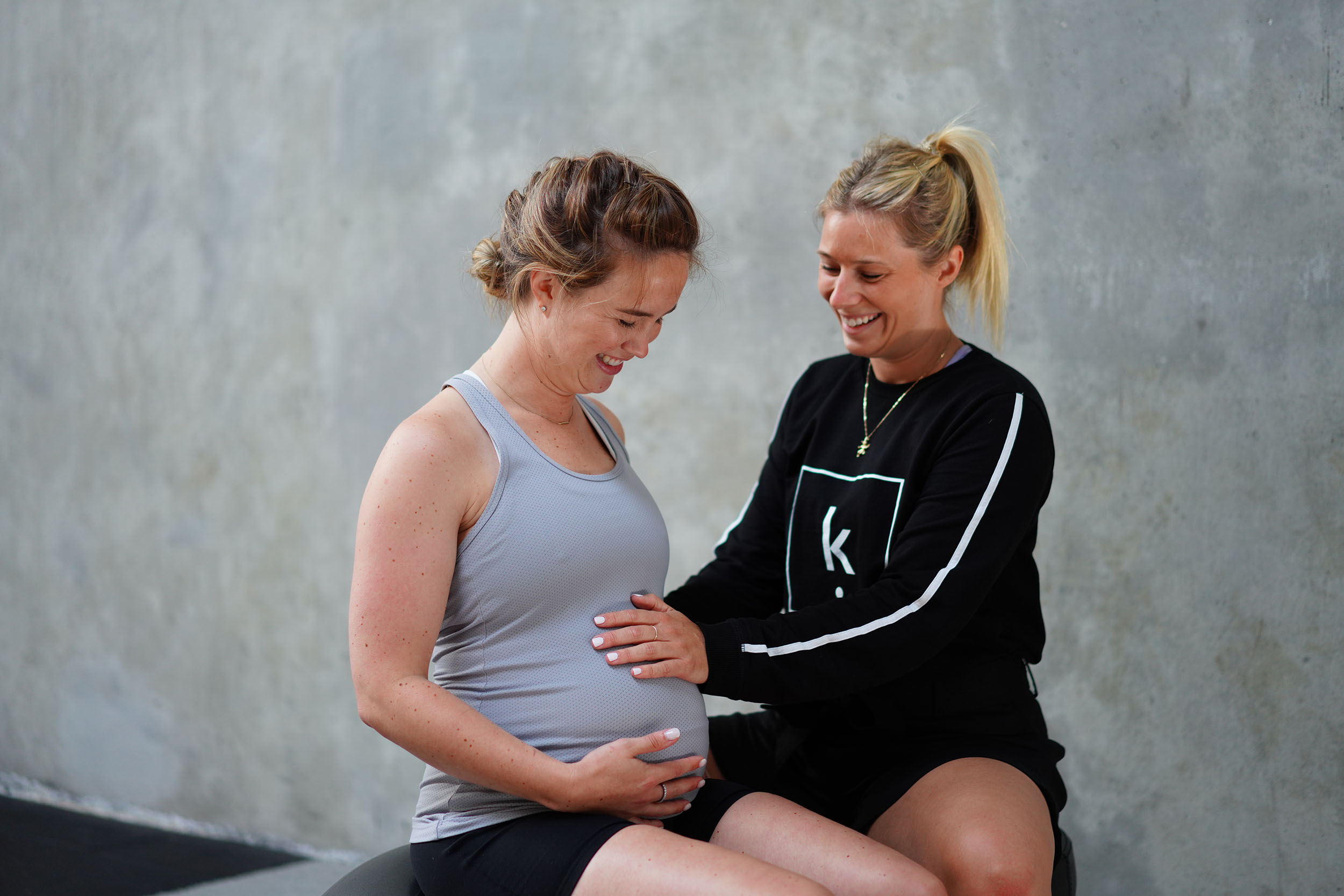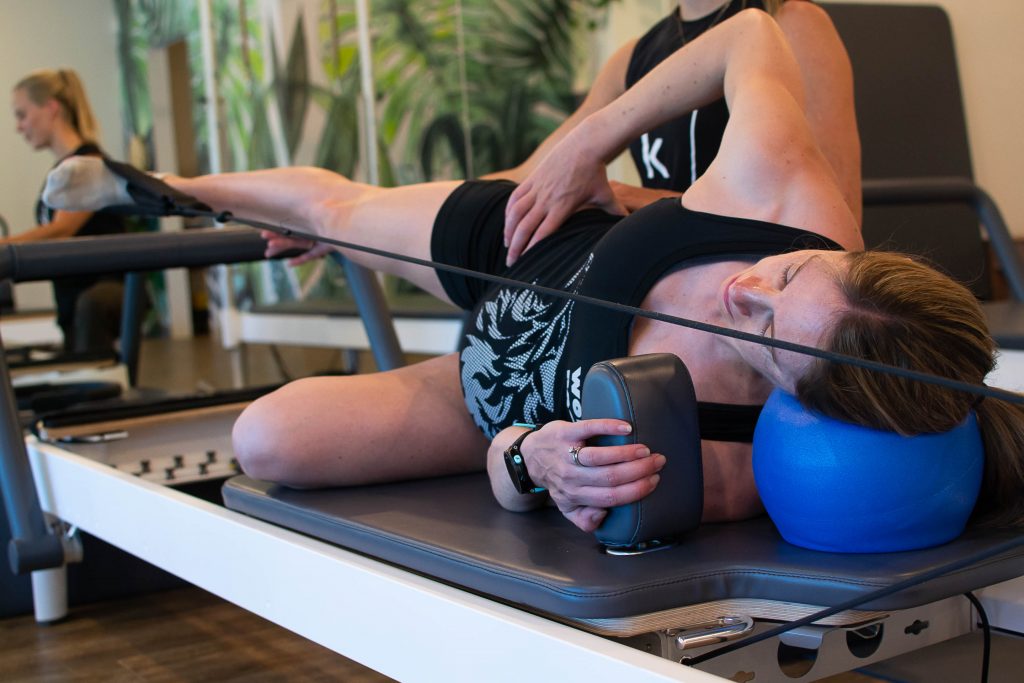Safe exercise during pregnancy.
December 10thFrom the moment you see that little ‘+’ sign pop up on the stick, there will be a million thoughts and questions running through your mind, and it’s okay not to have it all figured out. The purpose of this blog is to educate you on the most up-to-date guidelines regarding safe physical activity during pregnancy, and how we at Kinematics can help.

The ACOG (The American College of Obstetricians and Gynecologists) has had four major publications addressing the safety of exercise during pregnancy (1985, 1994, 2002, 2015). Each publication has demonstrated an increasing acceptance of exercise being not only safe but beneficial throughout pregnancy. You may however find some of the recent guidelines a little surprising if you have previously discussed exercise options with other healthcare practitioners who take a more conservative approach. It is important to appreciate previous viewpoints but also understand what is currently considered safe for you and your bub. The guidelines about to be discussed are intended for healthy pregnant women, and if you are deemed a high-risk pregnancy (i.e. pre-eclampsia, persistent bleeding, placenta praevia, gestational diabetes, incompetent cervix) you should see a health professional who is familiar with your condition and its implications for exercise to closely monitor your exercise regime.
Rewinding to the mid-1900s, pregnancy was regarded as a state of confinement, and it was accepted that exercise should be discouraged when pregnant. Practitioners were overly cautious because, without research, no one knew and understood the effects that exercise had during pregnancy.
In 1985 the ACOG guidelines stated that women who have previously engaged in regular physical activity may continue to do so with the following restrictions:
• Do not exercise > 15min
• Maternal heart rate < 140bpm
• Core temp < 38deg Celsius
By 1994, heart rate and time restrictions were no longer placed on healthy pregnant women who had previously exercised and:
• Women who have previously exercised can continue mild-moderate exercise
• Regular (3x/week) is preferable to intermittent
• Avoid exercising in supine after 1st trimester
• Avoid prolonged periods of motionless standing
• Should not exercise to fatigue/exhaustion
• Avoid any exercise with potential for even mild abdominal trauma
An even larger change in viewpoint toward exercise in pregnancy was accepted in 2002, which was triggered by an influx of research and discussion on gestational diabetes in the 1990s. Better pregnancy outcomes could be expected with the following:
• 30 minutes or more of moderate-intensity exercise on most if not all days is recommended for all pregnant women in the absence of medical or obstetric complications.
• Exercise can be safe and beneficial in previously sedentary individuals.
• Following medical review, exercise may still be recommended in women in the presence of medical or obstetric complications.
• Exercise can play an important role in the prevention and management of gestational diabetes mellitus.

The most up-to-date ACOG guidelines were released in 2015 and include:
• Women with uncomplicated pregnancies should be encouraged to engage in aerobic and strength-conditioning exercises before, during, and after pregnancy.
• An exercise program that leads to an eventual goal of moderate-intensity exercise (equivalent to brisk walking) for at least 20-30 minutes per day (150min per week) on most if not all days of the week should be developed.
• Physical activity in pregnancy has minimal risks and has been shown to benefit most women, although some modification to exercise routines may be necessary because of normal anatomic and physiologic changes and fetal requirements.
• Obstetrician-gynecologists and other obstetric care providers should carefully evaluate women with medical or obstetric complications before making recommendations on physical activity participation during pregnancy.
• Regular physical activity during pregnancy improves or maintains physical fitness, helps with weight management, reduces the risk of gestational diabetes in obese women, and enhances psychological well-being.
Based on a study by Bauer et al in 2010, 99% of health professionals felt that exercise during pregnancy is beneficial; however, 64% still believed that heart rate should not exceed 140bpm, and 60% of doctors and 84% of obstetricians were not aware of the 1994 ACOG Guidelines. It is important to be aware of why practitioners have placed these restrictions, and understand that it won’t be for some time until everyone is aware of the 2015 guidelines.
Speak to your obstetrician or midwife if you experience any of the following during or after exercise:
• Vaginal bleeding • Difficult or laboured breathing • Dizziness • Headache • Chest pain • Muscle weakness • Calf pain or swelling • Preterm labour • Decreased fetal movement • Amniotic fluid leakage
For uncomplicated pregnancies, it is generally safe to continue exercising at your previous capacity. This capacity may be increased at a slow rate and preferably with professional guidance. The concern with beginning exercise at a higher intensity than what your body is accustomed to is your muscles require increased blood flow to deliver more oxygen and this is diverted away from your uterus.
In conjunction with hands-on treatment at Kinematics (Osteopathy, Physiotherapy, and Myotherapy), we offer 1:1 and 1:4 Clinical Exercise sessions to encourage optimal health and alignment throughout your pregnancy. We understand that all pregnancies are different and therefore conduct comprehensive clinical assessments to create tailored exercise programs. Whether you are a professional runner, occasional CrossFitter, or call walking to and from the car the extent of your current exercise program, we can help you feel confident that both you and baby’s health are being looked after throughout your pregnancy.
By Amy Wiley
Physiotherapist | Kinematics Health + Performance
For further information regarding clinical exercise and Pilates during your pregnancy and the postnatal period, give us a call on 03 9421 3661 or check out our Pregnancy Pilates service page.
